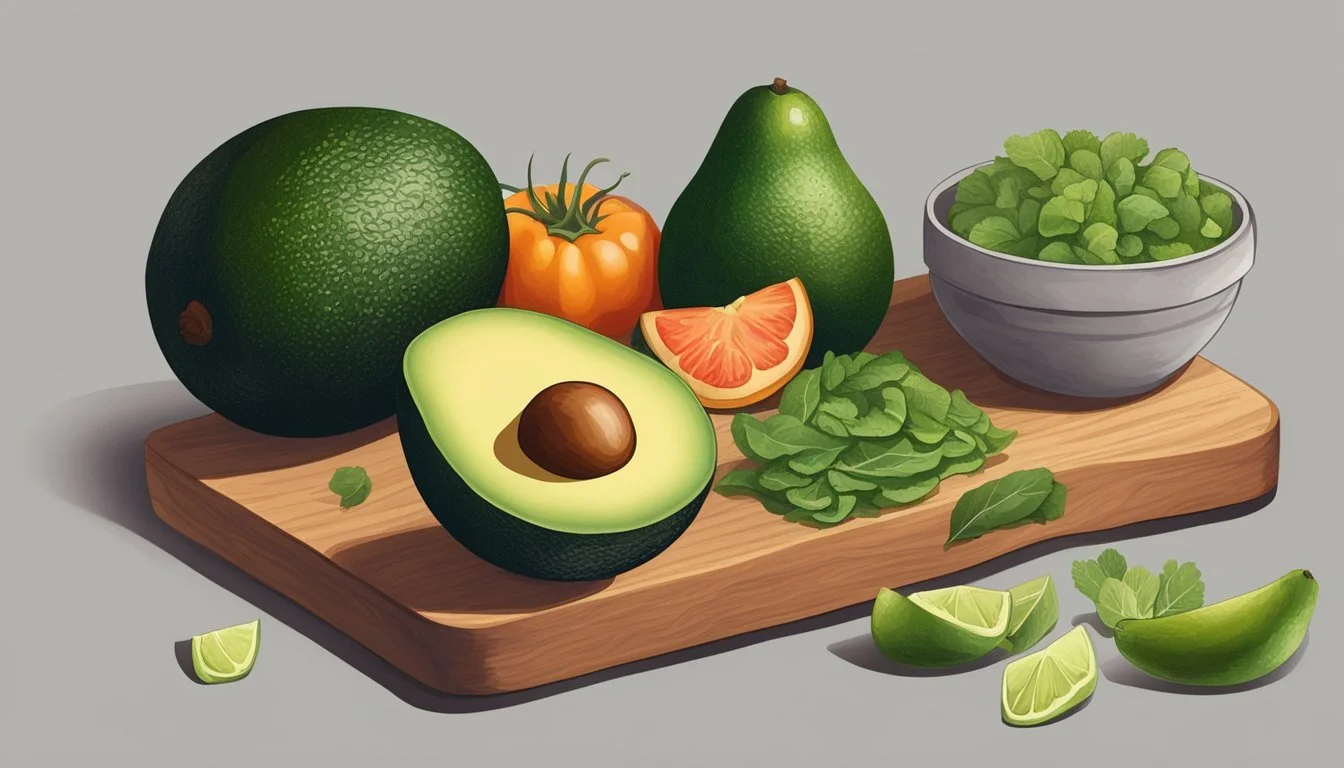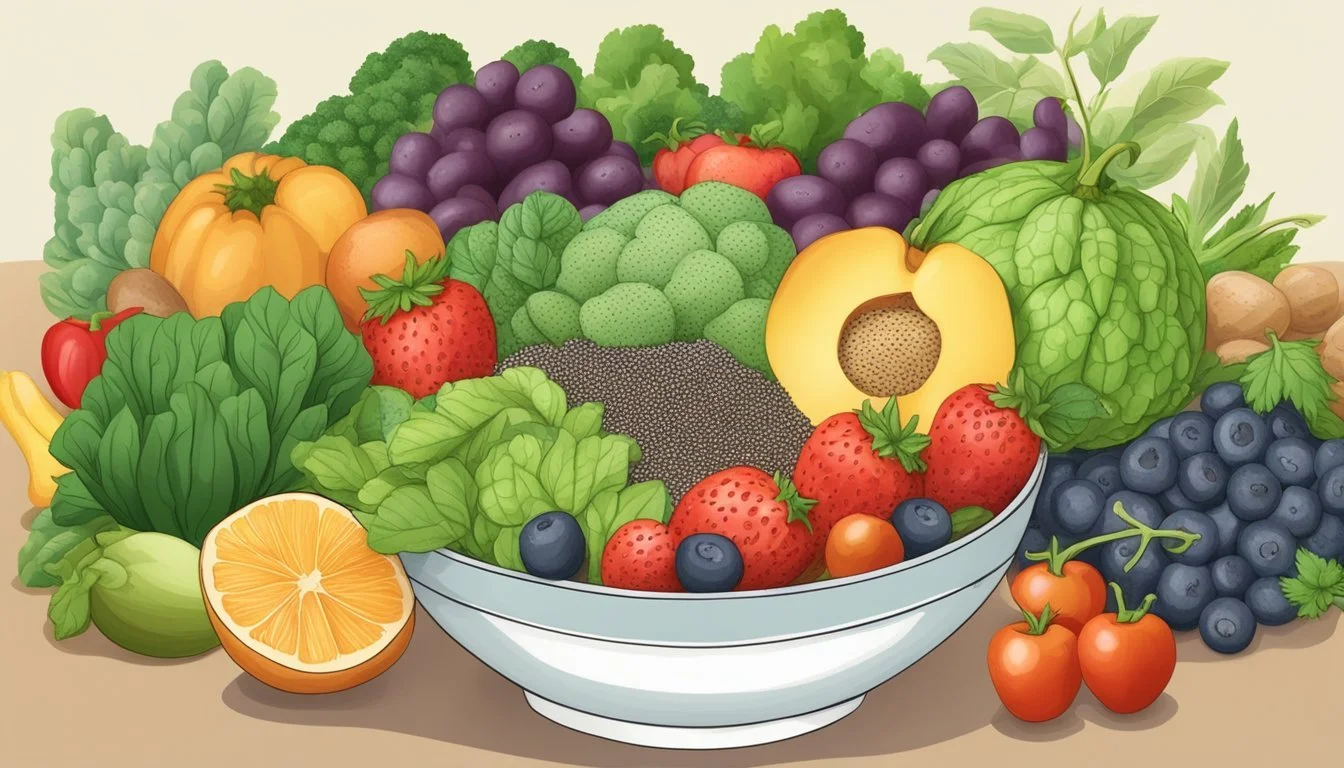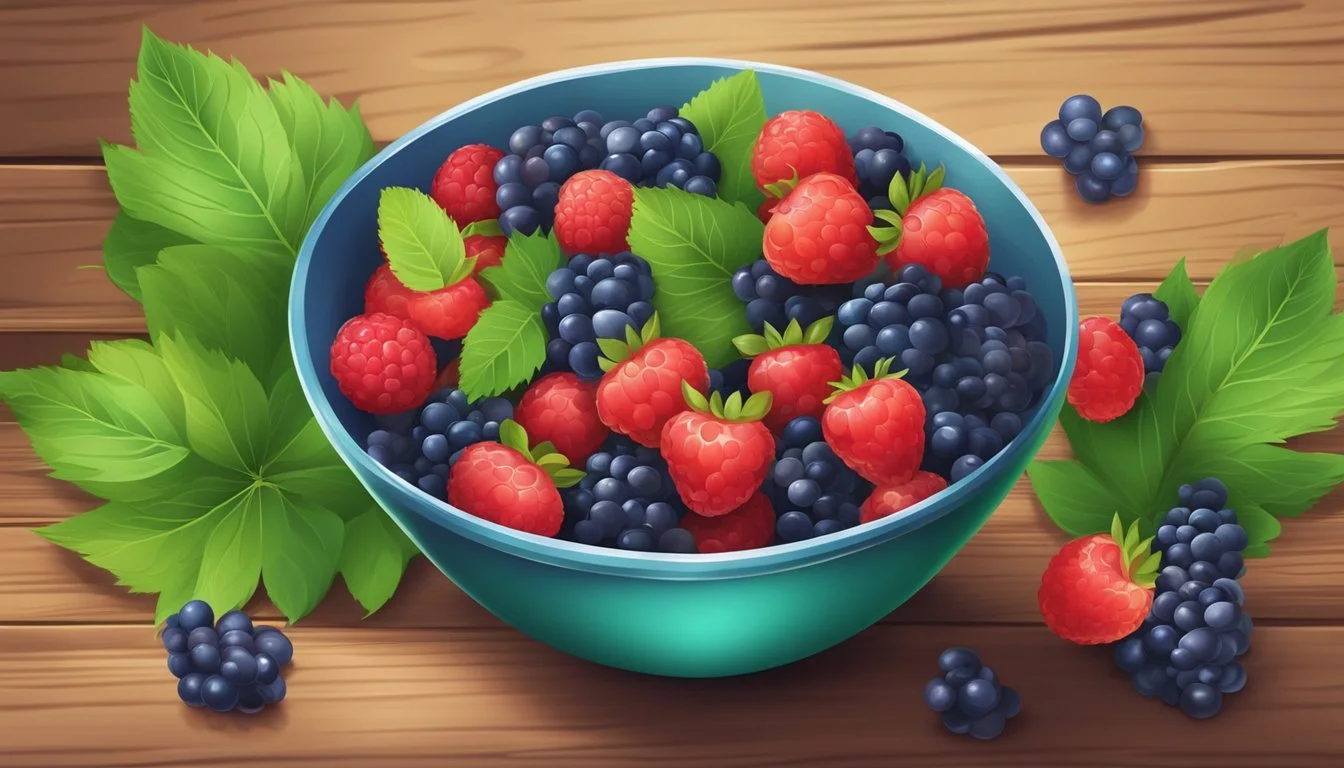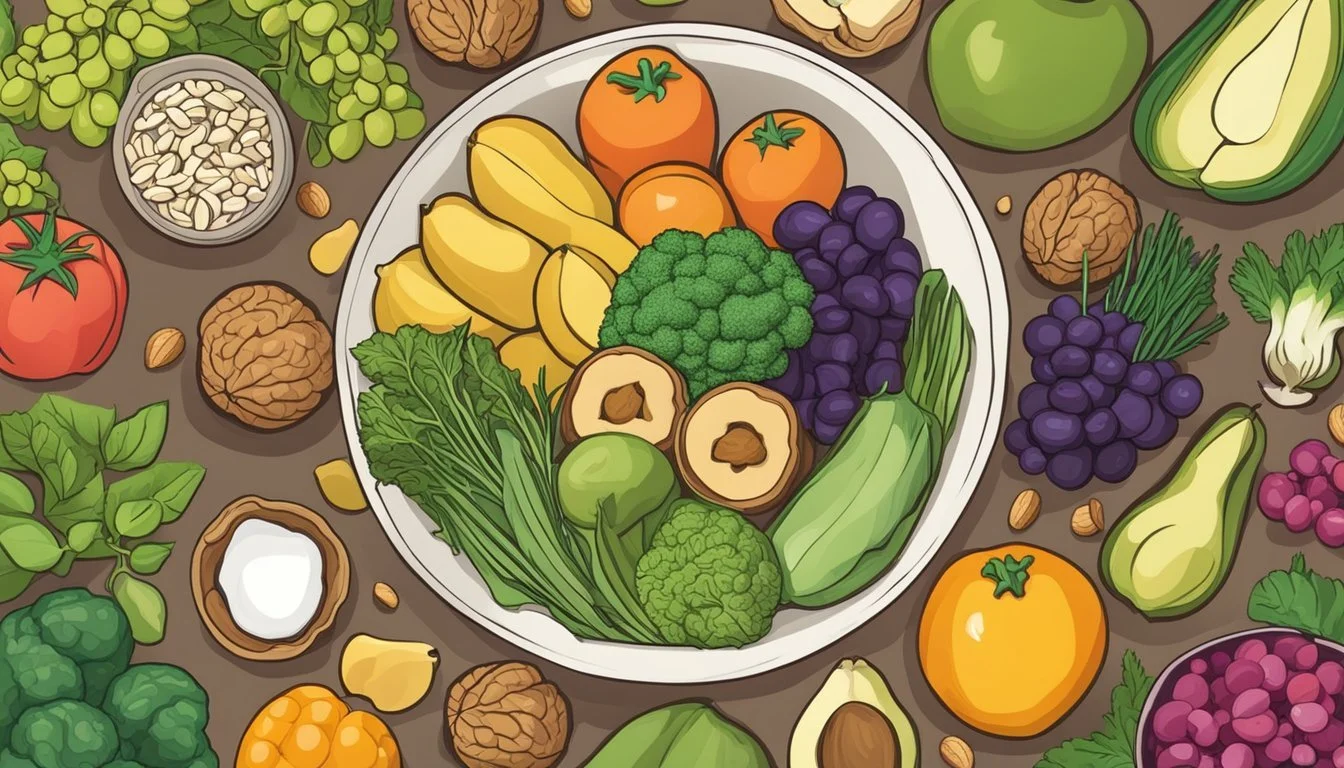Nutrient-Rich Foods to Support Ovarian Cyst Healing
Ovarian cysts, fluid-filled sacs that develop on or inside the ovaries, can be a source of discomfort for many women. While they are often harmless and can resolve on their own, diet can play a role in managing symptoms and potentially reducing their occurrence.
Incorporating certain foods into your diet may help support ovarian health and mitigate the impact of cysts. This article explores various foods believed to offer benefits for those dealing with ovarian cysts, providing practical dietary adjustments aimed at promoting overall well-being.
1) Fruits Rich in Fiber
Fruits that are high in fiber play a crucial role in managing ovarian cysts. They assist in regulating the digestive system and maintaining balanced hormone levels, which can help prevent cyst formation.
Apples are a great source of both soluble and insoluble fiber. Soluble fiber can help lower cholesterol and blood sugar levels, while insoluble fiber aids in digestion.
Pears offer a similar fiber profile to apples, providing both types of fiber that contribute to overall digestive health. Pears are an easy and tasty way to increase fiber intake.
Berries like raspberries, blackberries, and strawberries are also high in fiber. They contain a mix of soluble and insoluble fiber, making them excellent for aiding digestion and reducing inflammation.
Avocados, often considered a superfood, are rich in fiber and healthy fats. They help maintain progesterone levels in the body, which is important since an imbalance of hormones can lead to the development of ovarian cysts.
Oranges and other citrus fruits not only provide a good amount of fiber but are also rich in vitamin C. This combination helps support the immune system and digestive health.
These fiber-rich fruits are beneficial for overall health and can contribute positively to managing ovarian cysts. Incorporating them into the diet can help support the body's hormonal balance and digestive system.
2) Leafy Green Vegetables
Leafy green vegetables are packed with vital nutrients that can support ovarian health. Spinach, kale, and Swiss chard are excellent options. These vegetables are rich in fiber, vitamins, and minerals that can help reduce inflammation and support overall reproductive well-being.
Magnesium is one key nutrient found in dark leafy greens. It helps alleviate pain and discomfort associated with ovarian cysts. In addition, these greens provide ample amounts of vitamin C, which supports immune function.
Including a variety of leafy greens in the diet can also enhance detoxification processes in the body. They contain antioxidants and phytochemicals that help protect cells from damage and reduce oxidative stress.
Moreover, the high fiber content aids in regulating blood sugar levels and promotes healthy digestion. This can be particularly beneficial for individuals with Polycystic Ovary Syndrome (PCOS), as it may help manage symptoms more effectively.
Incorporating leafy greens into meals can be simple and versatile. They can be added to salads, smoothies, soups, or even sautéed as a side dish. Regular consumption of these nutrient-dense vegetables can be a valuable part of a diet aimed at supporting ovarian health and managing cysts.
3) Wild-caught Salmon
Wild-caught salmon can be beneficial for individuals dealing with ovarian cysts. Rich in omega-3 fatty acids, it helps in reducing inflammation in the body, which may alleviate some symptoms associated with cysts.
Omega-3s in salmon also aid in hormone regulation. Balanced hormones can reduce the formation of cysts over time. This fish is also a high-quality protein source, providing essential nutrients without unhealthy fats.
Additionally, wild-caught salmon contains high levels of antioxidants. These compounds help protect cells from damage, which may contribute to overall ovarian health. Including salmon in the diet can be a strategic move for those looking to manage ovarian cysts naturally.
4) Avocado
Avocado is a nutrient-rich food that can be beneficial for individuals dealing with ovarian cysts. It is high in healthy fats, particularly monounsaturated fats, which have anti-inflammatory properties. This can help reduce inflammation associated with ovarian cysts.
Besides healthy fats, avocados contain essential vitamins and minerals. They are a good source of vitamin K, vitamin E, vitamin C, and folate. These nutrients support overall reproductive health and help in managing ovarian cyst symptoms.
The fiber content in avocados can aid digestion and promote a healthy gut. A well-functioning digestive system is important for hormone regulation, which can be crucial for those suffering from ovarian cysts.
Incorporating avocados into daily meals is simple. They can be added to salads, smoothies, or enjoyed as a spread on whole-grain bread. Regularly consuming avocado may contribute to better reproductive health and help manage ovarian cysts naturally.
5) Chia Seeds
Chia seeds, though small, pack a nutritional punch that can be beneficial for managing ovarian cysts. These tiny seeds are rich in omega-3 fatty acids, which may help reduce inflammation and promote hormonal balance.
Omega-3 fatty acids, found in chia seeds, are known to support overall reproductive health. The anti-inflammatory properties can be particularly helpful in easing symptoms associated with ovarian cysts.
Chia seeds also provide a good amount of fiber, which is essential for maintaining digestive health. A well-functioning digestive system can indirectly support hormonal balance, as gut health is linked to overall hormone regulation.
Additionally, chia seeds are a source of essential minerals such as magnesium, which is important for muscle function and can help alleviate cramps or discomfort.
Incorporating chia seeds into the diet is easy. They can be added to smoothies, yogurt, or oatmeal. Their ability to absorb liquid and form a gel-like consistency makes them a versatile ingredient in various recipes.
Regular consumption of chia seeds could be a simple, natural way to support the body in managing ovarian cysts.
6) Broccoli
Broccoli is a nutrient-dense vegetable that can provide significant health benefits for those managing ovarian cysts. Rich in antioxidants, this cruciferous vegetable helps combat inflammation, which can be a contributing factor to cyst development.
Broccoli contains high levels of Vitamin C, which supports immune function and helps in repairing damaged tissues. The fiber content in broccoli aids in maintaining a healthy weight, which is crucial for hormonal balance.
This vegetable is also a good source of DIM (Di-Indolyl Methane), a compound found in cruciferous vegetables that helps in the metabolism of estrogen. Proper estrogen metabolism can reduce the risk of cyst formation by balancing hormone levels.
Eating broccoli regularly can help support overall reproductive health. It can be consumed in various forms, such as steamed, roasted, or added to salads and soups. Incorporating this vegetable into daily meals offers a simple and natural way to help manage ovarian cysts.
7) Berries
Berries are packed with antioxidants, vitamins, and fiber. These nutrients support overall health and can help reduce inflammation.
Blueberries, strawberries, raspberries, and blackberries are common choices. Each type provides unique benefits due to their different antioxidant profiles.
Antioxidants in berries help to combat oxidative stress, a factor linked to the formation and growth of cysts. Including these fruits in the diet may assist in managing ovarian cysts.
Additionally, berries have a low glycemic index. This is beneficial for hormone balance, as stable blood sugar levels are crucial for reducing symptoms associated with ovarian cysts and conditions like PCOS.
Berries are also rich in vitamin C, which supports immune function and tissue repair. This can be helpful for those dealing with ovarian cysts.
Regular consumption of fresh or frozen berries can be an easy and tasty way to enhance nutritional intake and support reproductive health.
8) Organic Chicken
Organic chicken is a beneficial addition to a diet aimed at managing ovarian cysts. It provides a high-quality source of lean protein, essential for tissue repair and overall health.
Organic chicken is free from antibiotics and hormones, which can disrupt hormonal balance. This makes it a healthier choice compared to conventionally raised poultry.
This type of chicken is also rich in essential nutrients such as B vitamins, which support energy production and metabolic function.
Including organic chicken in meals can help maintain stable blood sugar levels. Blood sugar stability is crucial in managing symptoms associated with ovarian cysts.
Incorporating organic chicken in a balanced diet can provide necessary proteins and nutrients to support overall reproductive health.
When preparing organic chicken, choose cooking methods like grilling, baking, or steaming to preserve its nutritional integrity. This will ensure that you get the maximum health benefits from your meals.
By choosing organic chicken, individuals can enjoy a healthier protein source that supports the management of ovarian cysts and overall well-being.
9) Quinoa
Quinoa is a nutrient-rich grain that can be beneficial for those dealing with ovarian cysts. It is packed with essential nutrients, including protein, fiber, and various vitamins and minerals.
The high protein content in quinoa can help balance blood sugar levels. Stable blood sugar levels are important for hormonal health and may indirectly influence the formation of ovarian cysts.
Quinoa is also a good source of magnesium. Magnesium plays a role in the body's overall hormonal balance, which can be crucial for managing ovarian cysts. This grain provides essential amino acids that support the body's healing processes.
In addition to its nutritional profile, quinoa is gluten-free, making it suitable for those with gluten sensitivities. Including quinoa in meals can help diversify the diet while offering a wholesome alternative to refined grains.
Quinoa is versatile and can be used in salads, soups, and as a substitute for rice or pasta. Its mild flavor allows it to blend well with various dishes, making it easy to incorporate into a balanced diet.
Regular consumption of quinoa can contribute to overall health, potentially aiding in the management of ovarian cysts through a nutrient-dense and balanced diet. Integrating it into meals is a practical step towards supporting hormonal and reproductive health.
10) Walnuts
Walnuts are a nutrient-dense food that may provide benefits for those dealing with ovarian cysts. Rich in omega-3 fatty acids, walnuts help reduce inflammation, a common issue associated with cysts.
These nuts also contain significant amounts of magnesium. Magnesium can aid in relieving pain and discomfort from ovarian cysts. It is crucial for many bodily functions, including muscle relaxation and nerve function.
Walnuts are a good source of antioxidants. Antioxidants help fight oxidative stress, which can play a role in the development of cysts. Incorporating walnuts into a balanced diet may support overall ovarian health.
Besides their anti-inflammatory and antioxidant properties, walnuts contain fiber. Fiber helps regulate blood sugar levels, which is particularly beneficial for those with Polycystic Ovary Syndrome (PCOS). Stable blood sugar levels can help manage hormone imbalances linked to cyst formation.
Walnuts can be easily included in the diet. They can be added to salads, yogurt, or consumed as a snack. Regular consumption of walnuts offers a convenient and tasty way to potentially aid in managing ovarian cyst symptoms.
How Diet Impacts Ovarian Cysts
Diet can play a crucial role in managing and potentially reducing ovarian cysts. Key factors include the types of nutrients consumed and how diet affects hormonal balance.
Role of Nutrients
Certain nutrients may help manage ovarian cysts. For example, omega-3 fatty acids, found in flaxseeds and fish, are known for their anti-inflammatory properties. These can help reduce inflammation and cyst size.
Antioxidants, such as vitamins C and E, can also support ovarian health. Fruits like berries and vegetables like spinach are rich in these vitamins. They help combat oxidative stress, potentially reducing cyst growth.
Additionally, incorporating foods like ginger and turmeric, known for their anti-inflammatory benefits, might offer support. Studies suggest that ginger could help regulate follicle-stimulating hormones (FSH), possibly preventing new cysts from forming.
Hormonal Balance
Maintaining hormonal balance is essential for reducing ovarian cysts. Foods that stabilize blood sugar levels, such as whole grains and lean proteins, can help manage insulin levels. High insulin levels are often linked to the development of ovarian cysts, especially in cases of polycystic ovary syndrome (PCOS).
Avoiding refined sugars and processed foods is critical. These can lead to insulin spikes, exacerbating cyst formation. Instead, opting for low-glycemic foods like vegetables and beans helps maintain stable insulin levels.
Including healthy fats, such as those from avocados and nuts, supports hormone production, helping to balance estrogen and progesterone levels. This balance is key to regulating the menstrual cycle and reducing the risk of cysts.
Key Nutrients for Ovarian Health
Incorporating specific nutrients into the diet can play a significant role in managing ovarian health. This section elucidates how Omega-3 fatty acids and antioxidants contribute to maintaining healthy ovaries.
Omega-3 Fatty Acids
Omega-3 fatty acids are crucial for supporting ovarian health due to their anti-inflammatory properties. Salmon, flaxseed, and walnuts are excellent sources of Omega-3s.
Omega-3s can help reduce inflammation, which is often associated with ovarian cysts and PCOS (Polycystic Ovary Syndrome). They may also improve blood flow to the ovaries, enhancing their function and overall health. Studies suggest that regular consumption of Omega-3-rich foods can balance hormone levels, potentially reducing the formation of cysts.
For optimal intake, aim for two servings of fatty fish per week or incorporate plant-based Omega-3 sources daily. Supplements like fish oil can also be considered, but dietary sources are preferable due to their additional nutrients.
Antioxidants
Antioxidants play a vital role in protecting ovarian cells from oxidative stress and damage. Key antioxidant-rich foods include berries, leafy greens, and nuts.
Oxidative stress can lead to inflammation and may contribute to the development of ovarian cysts. Consuming foods rich in antioxidants helps neutralize free radicals, thereby protecting ovarian tissue and supporting overall reproductive health.
Vitamins C and E, along with selenium and beta-carotene, are essential antioxidants beneficial for ovarian health. Including a variety of colorful fruits and vegetables in the diet ensures a sufficient intake of these critical nutrients. Regular consumption is advisable to maintain a protective effect against cellular damage.
Lifestyle and Dietary Tips
Incorporating specific lifestyle and dietary changes can play a significant role in managing ovarian cysts. The focus should be on balanced meal planning and maintaining proper hydration levels to support health.
Meal Planning
A well-structured eating plan is critical for those dealing with ovarian cysts. Prioritizing foods rich in fiber such as vegetables, fruits, and whole grains can help regulate hormones. Lean proteins like fish, chicken, and legumes also contribute to a balanced diet.
She should also include foods high in antioxidants like berries, nuts, and green leafy vegetables to reduce inflammation. Reducing refined sugars and processed foods can stabilize insulin levels, which is particularly beneficial for those with PCOS.
Eating small, frequent meals through the day can help maintain blood sugar levels. Incorporating omega-3 fatty acids found in fish and flaxseed helps with hormone regulation and can reduce cyst formation.
Hydration
Staying adequately hydrated is essential. Drinking plenty of water helps with metabolism and may support the body's natural detoxification processes. It's recommended to consume roughly half of one’s body weight in ounces each day.
Additionally, some herbal teas like green tea and chamomile can offer anti-inflammatory benefits. Limiting caffeine and sugary drinks also supports overall health.
Incorporating lemon or cucumber slices into water may enhance hydration and provide extra nutrients. Hydration helps to support overall bodily functions and may aid in reducing the occurrence of cysts.











